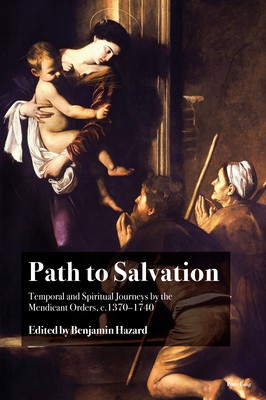
- We will send in 10–14 business days.
- Publisher: Peter Lang Ltd, International Academic Publishers
- ISBN-10: 1803740396
- ISBN-13: 9781803740393
- Format: 15.2 x 22.9 x 1.4 cm, minkšti viršeliai
- Language: English
- SAVE -10% with code: EXTRA
Path to Salvation (e-book) (used book) | bookbook.eu
Reviews
Description
Temporal and spiritual journeys were a shared characteristic of life for mendicant friars and the laity in medieval and early modern times. This book reflects the objective approach of trained historians in its skilled deployment of source documents. Throughout these pages, we meet with wandering friars and the lay faithful, some for the first time. The contributors are international scholars. Each enquires into a specific area of study from the fourteenth to the eighteenth century. In particular, this reveals that travel in its various forms represented an intrinsic link between the four great mendicant orders: Augustinians, Carmelites, Dominicans and Franciscans. Until recently, mendicant historiography was written by and for members of each respective order.
The contents are grouped thematically into three sections. The first considers the significance of travel in mendicant writings about the Eastern Mediterranean and Europe. The opening chapter examines the Old Testament traditions of the Carmelites, followed by two essays on fifteenth-century Italian Franciscans. These emphasise how travel was essential for Observant renewal to succeed. The second section of the book concentrates on early modern Spain. Travel was not limited to the outward journey. The humanist poetry of the Augustinian friar, Luis de León, attended to the inner journey of the soul during this life. The next chapter draws attention to interrelations between laity and clergy. This provides insights into the soul's journey into death according to the behaviour of the lay faithful. In the third section, we find the fact-finding journeys of Bartolomé de las Casas on land and sea, in defence of native peoples in the New World. The volume closes with a study of a Dominican friar who followed his own path rather than the accepted routine of travel for friars. By exploring a wide range of experiences over five centuries, this book shows that travel contributed to religious development in many parts of the world.
EXTRA 10 % discount with code: EXTRA
The promotion ends in 21d.22:08:14
The discount code is valid when purchasing from 10 €. Discounts do not stack.
- Publisher: Peter Lang Ltd, International Academic Publishers
- ISBN-10: 1803740396
- ISBN-13: 9781803740393
- Format: 15.2 x 22.9 x 1.4 cm, minkšti viršeliai
- Language: English English
Temporal and spiritual journeys were a shared characteristic of life for mendicant friars and the laity in medieval and early modern times. This book reflects the objective approach of trained historians in its skilled deployment of source documents. Throughout these pages, we meet with wandering friars and the lay faithful, some for the first time. The contributors are international scholars. Each enquires into a specific area of study from the fourteenth to the eighteenth century. In particular, this reveals that travel in its various forms represented an intrinsic link between the four great mendicant orders: Augustinians, Carmelites, Dominicans and Franciscans. Until recently, mendicant historiography was written by and for members of each respective order.
The contents are grouped thematically into three sections. The first considers the significance of travel in mendicant writings about the Eastern Mediterranean and Europe. The opening chapter examines the Old Testament traditions of the Carmelites, followed by two essays on fifteenth-century Italian Franciscans. These emphasise how travel was essential for Observant renewal to succeed. The second section of the book concentrates on early modern Spain. Travel was not limited to the outward journey. The humanist poetry of the Augustinian friar, Luis de León, attended to the inner journey of the soul during this life. The next chapter draws attention to interrelations between laity and clergy. This provides insights into the soul's journey into death according to the behaviour of the lay faithful. In the third section, we find the fact-finding journeys of Bartolomé de las Casas on land and sea, in defence of native peoples in the New World. The volume closes with a study of a Dominican friar who followed his own path rather than the accepted routine of travel for friars. By exploring a wide range of experiences over five centuries, this book shows that travel contributed to religious development in many parts of the world.


Reviews